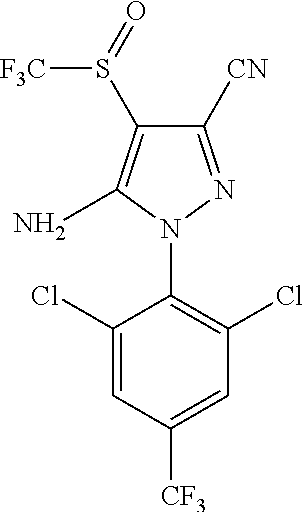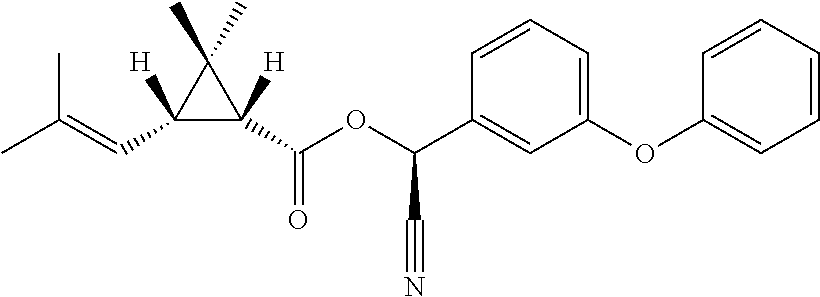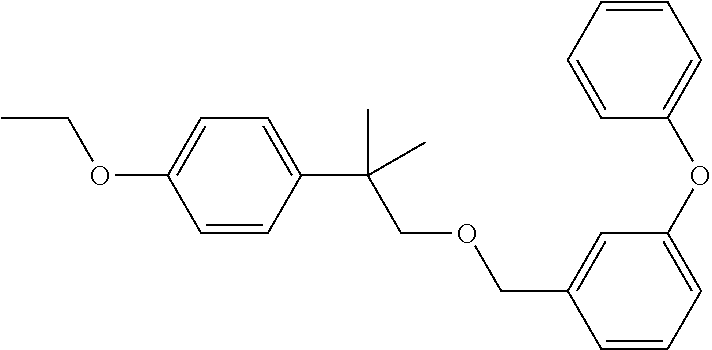Spot-on pesticide composition
a technology of pesticide composition and pouron, which is applied in the direction of drug composition, antinoxious agent, extracellular fluid disorder, etc., can solve the problems of substantial disadvantage, uncomfortable and burdensome animal, and unpleasant for both animal and owner, so as to reduce increase the kill rate of pests. the effect of speeding up and reducing the risk of adverse effects
- Summary
- Abstract
- Description
- Claims
- Application Information
AI Technical Summary
Benefits of technology
Problems solved by technology
Method used
Image
Examples
example 1
Method of Making a Fipronil / Cyphenothrin Spot-On Pesticide Composition for Dogs
[0060]
IngredientAmount for 1000 LFipronil tech. (As 100%)98 kg (99.7 kg as 98.3%)Cyphenothrin (As 100%)50 kg (53 kg as 94.4%)Tocopherol Nicotinate53 kgDiethylene glycol monoethyl etherUp to 1000 L (about 794.3 kg)
[0061]The diethylene glycol monoethyl ether and the tocopherol nicotinate were charged to a vessel and heated to a temperature of 50° C. (about 1 hour). Once heated, the fipronil and the cyphenothrin were charged to the vessel and all components were mixed until homogenous solution was formed (about 1 hour).
example 2
Method of Making a Fipronil / S-Methoprene / Cyphenothrin Spot-On Pesticide Composition for Dogs
[0062]
IngredientAmount for 1000 LFipronil tech. (As 100%)98 kg (99.7 kg as 98.3%)S-methoprene (As 100%)88 kg (92.1 kg as 95.5%)Cyphenothrin (As 100%)50 kg (53 kg as 94.4%)Tocopherol Nicotinate53 kgDiethylene glycol monoethyl etherUp to 1000 L (about 702.2 kg)
[0063]The diethylene glycol monoethyl ether and the tocopherol nicotinate were charged to a vessel and heated to a temperature of 50° C. (about 1 hour). Once heated, the fipronil, the cyphenothrin, and the S-methoprene were charged to the vessel and all components were mixed until a homogenous solution was formed (about 1 hour).
example 3
Method of Making a Fipronil / Etofenprox Spot-On Pesticide Composition for Cats
[0064]
IngredientAmount for 1000 LFipronil tech. (As 100%) 98 kg (99.7 kg as 98.3%)Etofenprox (As 100%)150 kg (158.9 kg as 94%)Diethylene glycol monoethyl etherUp to 1000 L (about 741.4 kg )
[0065]The diethylene glycol monoethyl ether was charged to a vessel and heated to a temperature of 50° C. (about 1 hour). Once heated, the fipronil and the etofenprox were charged to the vessel and all components were mixed until a homogenous solution was formed (about 1 hour).
PUM
| Property | Measurement | Unit |
|---|---|---|
| temperature | aaaaa | aaaaa |
| boiling point | aaaaa | aaaaa |
| dielectric constant | aaaaa | aaaaa |
Abstract
Description
Claims
Application Information
 Login to View More
Login to View More - R&D
- Intellectual Property
- Life Sciences
- Materials
- Tech Scout
- Unparalleled Data Quality
- Higher Quality Content
- 60% Fewer Hallucinations
Browse by: Latest US Patents, China's latest patents, Technical Efficacy Thesaurus, Application Domain, Technology Topic, Popular Technical Reports.
© 2025 PatSnap. All rights reserved.Legal|Privacy policy|Modern Slavery Act Transparency Statement|Sitemap|About US| Contact US: help@patsnap.com



